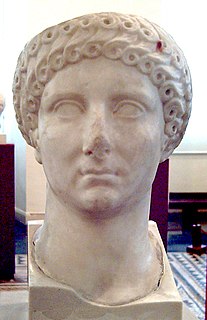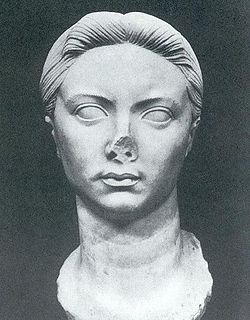
Agrippina the Elder, commonly referred to as "Agrippina the Elder", was a prominent member of the Julio-Claudian dynasty. She was born in c. 14 BC the daughter of Marcus Vipsanius Agrippa, a close supporter of Rome's first emperor Augustus, and Augustus' daughter Julia the Elder. At the time of her birth, her brothers Lucius and Gaius were the adoptive sons of Augustus and were his heirs until their deaths in AD 2 and 4, respectively. Following their deaths, her cousin Germanicus was made the adoptive son of Tiberius as part of Augustus' succession scheme in the adoptions of AD 4 in which Tiberius was adopted by Augustus. As a corollary to the adoption, Agrippina was wed to Germanicus in order to bring him closer to the Julian family.

Agrippina the Younger, also referred to as Agrippina Minor was a Roman empress and one of the more prominent women in the Julio-Claudian dynasty. Her father was Germanicus, a popular general and one-time heir apparent to the Roman Empire under Tiberius; and her mother was Agrippina the Elder, a granddaughter of the first Roman emperor Augustus. She was also the younger sister of Caligula, as well as the niece and fourth wife of Claudius.

Domitian was Roman emperor from 81 to 96. He was the younger brother of Titus and the son of Vespasian, his two predecessors on the throne, and the last member of the Flavian dynasty. During his reign, the authoritarian nature of his rule put him at sharp odds with the Senate, whose powers he drastically curtailed.

The Julio-Claudian dynasty was the first Roman imperial dynasty, consisting of the first five emperors—Augustus, Tiberius, Caligula, Claudius, and Nero—or the family to which they belonged. They ruled the Roman Empire from its formation under Augustus in 27 BC until AD 68, when the last of the line, Nero, committed suicide. The name "Julio-Claudian dynasty" is a historiographical term derived from the two main branches of the imperial family: the gens Julia and gens Claudia.

Livia Drusilla, also known as Julia Augusta after her formal adoption into the Julian family in AD 14, was the wife of the Roman emperor Augustus throughout his reign, as well as his adviser. She was the mother of the emperor Tiberius, paternal grandmother of the emperor Claudius, paternal great-grandmother of the emperor Caligula, and maternal great-great-grandmother of the emperor Nero. She was deified by Claudius who acknowledged her title of Augusta.
Berenice of Cilicia, also known as Julia Berenice and sometimes spelled Bernice, was a Jewish client queen of the Roman Empire during the second half of the 1st century. Berenice was a member of the Herodian Dynasty that ruled the Roman province of Judaea between 39 BC and 92 AD. She was the daughter of King Herod Agrippa I and a sister of King Herod Agrippa II.

The gens Julia or Iulia was one of the most ancient patrician families at Ancient Rome. Members of the gens attained the highest dignities of the state in the earliest times of the Republic. The first of the family to obtain the consulship was Gaius Julius Iulus in 489 BC. The gens is perhaps best known, however, for Gaius Julius Caesar, the dictator and grand uncle of the emperor Augustus, through whom the name was passed to the so-called Julio-Claudian dynasty of the 1st century AD. The nomen Julius became very common in imperial times, as the descendants of persons enrolled as citizens under the early emperors began to make their mark in history.

Claudia Livia Julia was the only daughter of Nero Claudius Drusus and Antonia Minor and sister of the Roman Emperor Claudius and general Germanicus, and thus the paternal aunt of the emperor Caligula and maternal great-aunt of emperor Nero, as well as the niece and daughter-in-law of Tiberius. She was named after her grandmother, Augustus' wife Livia Drusilla, and commonly known by her family nickname Livilla. She was born after Germanicus and before Claudius.

Vipsania Agrippina was the first wife of the Emperor Tiberius. She was the daughter of Marcus Vipsanius Agrippa and Pomponia Caecilia Attica, thus a granddaughter of Titus Pomponius Atticus. By marriage, she was also a great-niece to Quintus Tullius Cicero.
Julia the Younger or Julilla, Vipsania Julia Agrippina, Julia, Augustus' granddaughter, or Julia Minor, was a Roman noblewoman of the Julio-Claudian dynasty. She was the first daughter and second child of Marcus Vipsanius Agrippa and Julia the Elder. Along with her sister Agrippina the Elder, Julia was raised and educated by her maternal grandfather Augustus and her maternal step-grandmother Livia Drusilla.

Julia the Elder, known to her contemporaries as Julia Caesaris filia or Julia Augusti filia, was the daughter of Augustus Caesar, the first Roman Emperor, and his second wife, Scribonia. Julia was also stepsister and second wife of the Emperor Tiberius; maternal grandmother of the Emperor Caligula and the Empress Agrippina the Younger; grandmother-in-law of the Emperor Claudius; and maternal great-grandmother of the Emperor Nero.

Claudia Octavia was an empress of Rome. She was the daughter of the Emperor Claudius and stepsister and first wife of Emperor Nero.

Julia was the daughter of Roman dictator Julius Caesar by his first or second wife Cornelia, and his only child from his marriages. Julia became the fourth wife of Pompey the Great and was renowned for her beauty and virtue.

Drusilla of Mauretania was a Princess of Mauretania, North Africa and was the great grandchild of Ptolemaic Greek Queen Cleopatra VII of Egypt and Roman Triumvir Mark Antony.












